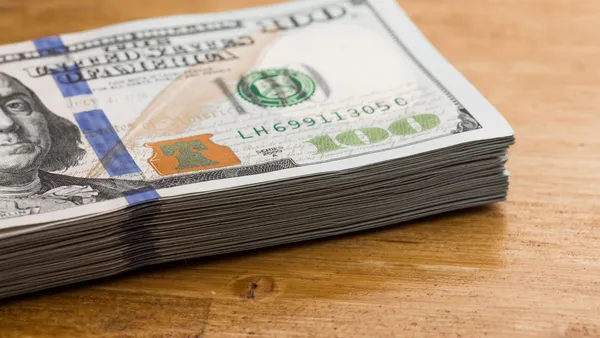Dive Brief:
- Consumer sentiment plunged 11% this month and inflation expectations surged to the highest level since 1981 amid anxiety about a mounting global trade war, the University of Michigan found in a survey released Friday.
- The mood among consumers has sunk more than 30% since December “amid growing worries about trade war” Joanne Hsu, director of the university’s survey, said in a statement. The slump is “pervasive and unanimous across age, income, education, geographic region and political affiliation,” she said.
- “Consumers report multiple warning signs that raise the risk of recession: expectations for business conditions, personal finances, incomes, inflation, and labor markets all continued to deteriorate this month,” Hsu said. The share of consumers expecting higher unemployment in the next 12 months rose to the highest level since 2009.
Dive Insight:
The survey ended April 8, a day before President Donald Trump announced a 90-day pause on reciprocal tariffs targeting virtually all U.S. trading partners. Trump maintained reciprocal tariffs on imports from China and 10% baseline tariffs on dozens of countries announced early this month.
Since Trump’s pause, however, the trade war between the world’s two largest economies has escalated. The U.S. has said cumulative tariffs on imports from China totaled 145%, prompting Beijing on Friday to retaliate by raising duties on all U.S. imports to 125%.
JPMorgan Chase CEO Jamie Dimon on Friday warned of potential harm to the U.S. from world trade conflict and other upheaval.
“The economy is facing considerable turbulence (including geopolitics), with the potential positives of tax reform and deregulation and the potential negatives of tariffs and ‘trade wars,’ ongoing sticky inflation, high fiscal deficits and still rather high asset prices and volatility,” Dimon said in a report on JPMorgan’s first quarter earnings.
Consumers expect inflation during the coming year to heat up to 6.7%, 1.7 percentage points higher than last month, according to the University of Michigan. Their long-run inflation expectations rose to 4.4% this month from 4.1% in March.
“During times of turbulence and uncertainty such as these, well-anchored inflation expectations are critically important for ensuring sustained price stability,” New York Federal Reserve Bank President John Williams said in a speech Friday. The central bank seeks to hold inflation at 2%.
Tariffs will stoke inflation this year to between 3.5% and 4%, Williams predicted.
Given “the slowdown in labor force growth due to reduced immigration and the combined effects of uncertainty and tariffs,” gross domestic product growth during the coming year will likely slow to below 1%, he said.
Also, unemployment will probably rise from the current 4.2% level to between 4.5% and 5%, according to Williams, who serves as vice chair of the policymaking Federal Open Market Committee.
A “pervasive sense of uncertainty is becoming increasingly evident,” he said. “There’s been a sharp decline in consumer sentiment, and business sentiment measures have weakened too.”
“At times of great uncertainty, consumers may put off making big decisions like buying a home or car, and businesses may delay investing until they have a better sense of what the future holds,” Williams said. “And when households and businesses cut back on spending, economic growth slows.”
Yet falling consumer sentiment does not necessarily herald a pullback in spending, according to Wells Fargo economists.
“Lower optimism isn’t a positive development for actual spending, but it alone won’t drive households into hiding,” they said in a report Friday.
Since the pandemic, consumers have belied metrics signaling depressed optimism and kept on spending, the economists said. “The U.S. consumer has proved remarkably resilient in recent years.”











